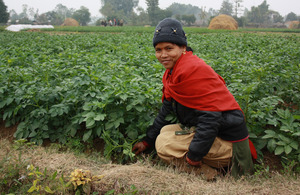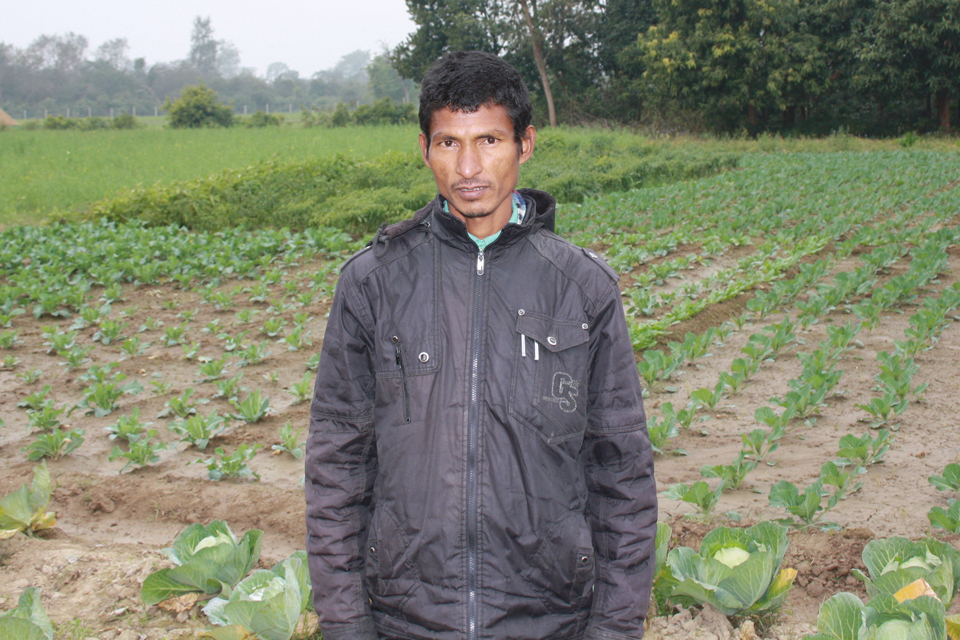A helping hand to rural farmers in Nepal
How a community support programme is improving the lives of the poorest

Santa Rani Chaudhari pictured near her vegetable plot. Picture: Robert Stansfield/DFID
Santa Rani Chaudhari, 30, a farmer living near Nepalgunj, in Western Nepal, has seen her life transformed. A mother of 2, she’s been given help to buy better seeds and advice on how to plant and grow vegetables and fruits through the UK aid supported Community Support Programme (CSP).
Smarter farming
Santa barely grew enough food to feed her 12-year-old son and 7-year-old daughter before she was given support to buy seeds and trained in growing crops. She now uses half her plot of land to grow vegetables and the other half for cereal crops.
“My husband is a driver but he does not make much money. We needed what I grew to feed the family but we were often hungry,” says Santa.
“I had to borrow money for my children to go to school. The interest rates were very high and I feared getting behind in my payments. I was always worried I would lose everything but I thought education was important. They would come home from school and help me in the fields because I had no one else to help me.”
But now, thanks to the UK aid funded Community Support Programme, Santa is making enough money to feed her family and send her children to school without any worries.
“Everything we grew was for us, but I have now made 30,000 rupees (about £200) in 3 months from selling crops. My children still help me but I hope soon I will make enough to employ someone else instead so they can just work on learning,” says Santa.
Better prospects, better living
Farmers across Nepal have been given help buying seeds, offered advice on growing vegetables and helped to build wells to irrigate their crops. These farmers are from isolated communities where 38% of people live below the poverty line and are often forced to walk more than two hours to their nearest paved road.
The Community Support Programme is now in its tenth year. It provides a life line for rural people – allowing them to grow and sell crops to feed their families, send their children to school and for those living beyond the reach of the government’s free healthcare programme, to pay for healthcare and the cost of transport to reach it.
Santa isn’t an exception. Many more farmers are telling the same story.
Thirty-eight-year-old Daya Ram Tharu, a father of three, used to earn 5,000 rupees per 3-month season from growing rice and maize on his small patch of land. But now, thanks to the CSP he has also managed to increase his earnings up to R33,000 from more expensive crops such as cabbages and tomatoes.

Daya Ram Tharu stands near his cabbage plot. Picture: Robert Stansfield/DFID
“We used to make very little money and all my children worked in the fields because I could not afford to give them an education,” says Daya.
“Without this help, I would still be a very poor man. I now make enough to pay for my children to have English language lessons. I don’t want them to be poor farmers like me. I want them to get jobs away from the village.
“I am also paying in instalments for a pumping system to get water from the ground to irrigate my crops. This will mean I can grow fruit and vegetables all year round and can afford to run my farm without help.”
The CSP’s priorities are set by the communities themselves. It is part of a larger programme that is bringing services to communities across Nepal.
Facts and Stats
- As well as help in growing crops, through the Community Support Programme families are being given support to set up and grow their own businesses and 1,000 youngsters are being trained so they can find a job.
- More than 2,800 communities have already benefitted from improved school facilities with more than 1,000 other earthquake resistant community buildings also due to be built.
- The programme has already helped 11,000 families improve their earning potential with training. Another 1,500 poor households are currently being helped to earn money.
- It has created about 20,000 fulltime jobs in some of the poorest districts of Nepal.
- Irrigation facilities supported by CSP are benefitting 65,000 homes.
- CSP makes funds available direct to communities and helps them decide what to spend them on.